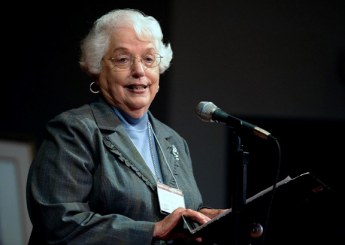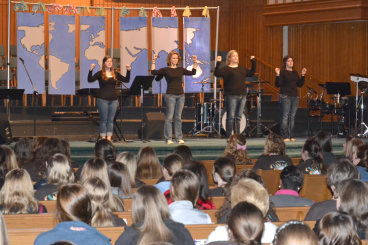Iowa conjures up images of a Midwestern state of green cornfields, big-time pig and dairy farming, small towns and the fictional setting for wonderful movies like “The Music Man” and “Field of Dreams.”
The Hawkeye State certainly is all those positive things and more. But Des Moines — Iowa’s state capital and largest city with 500,000 people — also is plagued with the same neighborhood gangs, crime, violence, drugs and poverty of other American cities. Just ask Jon and Mindy Jamison.
For almost nine years, Jon and Mindy, both 33, have been a husband-wife team of North American Mission Board (NAMB) missionaries, working as co-directors of the Friendship Baptist Center in inner-city Des Moines. The couple are two of more than 5,000 missionaries in the United States, Canada and their territories supported by the Annie Armstrong Easter Offering for North American Missions. They are also state church and community ministries directors for the Baptist Convention of Iowa.
Hope amid poverty
The Friendship Center’s nondescript building sits on the corner of Meek Avenue and Martin Luther King Jr. Parkway in Des Moines.
“The neighborhood surrounding the Friendship Baptist Center is a poverty-impacted community,” according to Jon. “Upwards of 30–35 percent of the households are in poverty. Many of the people are victims of crime. There’s a lot of violence, gang activity and drugs in the communities surrounding the center. So we have a challenge just outside our doors.
“Many people struggle with having something to eat, having clothes to wear, shelter, heat in the winter. For kids in the area, there’s no one at home to take care of them. Kids must find a way to wake themselves up in the morning. If there’s food in the house, they have to make their own breakfast. They have to find a way to school, if they go. Many kids are sort of their own parents. That may sound like fun, but it also brings some struggles for the kids,” he said.
Mindy echoes her husband. “The kids get up and don’t take a bath because there’s no water. They don’t have a toothbrush or shampoo. They probably forget to take their books to school. They walk to school in the cold, and it gets very cold in Des Moines,” Mindy said. “They go hungry and without basic needs, much less encouragement and nourishment.”
Teaching kids truth
“I think if that doesn’t break our heart [and] concern us, then our heart isn’t lined up with the heart of Christ. He was so concerned for the least of these,” she said.
Mindy, who grew up doing urban mission work in her native Fort Myers, Fla., calls the neighborhood around the Friendship Center “great” and “horrible” at the same time. The center serves primarily blacks, Hispanics and refugee families from Zaire, Sudan and Bosnia.
The Friendship Center is multifaceted. Kid’s Club is an after-school program in which children come in and get help with their homework and play board games or sports. They also learn about life skills and nutrition and even how to cook. And, of course, Jon and Mindy teach them about the Bible.
“Once we get to know the kids better, we offer a Bible study and teach them what God says about their lives and how God wants to be a part of their lives,” Jon said. “Many times, we tell them Bible stories, and it’s the first time they’ve ever heard Bible stories. It’s great to see the lights come on when they realize that God loves them and can provide for them.”
Telling the center’s kids Bible stories is different from teaching children who’ve grown up in a Southern Baptist church and can finish the story just by being given a character or topic. “Many of the neighborhood kids here are waiting on the edge of their seats to find out how the Bible story ends because they haven’t heard it before,” Mindy said.
Mindy credits the center’s 15 Kid’s Club volunteers who come and “pour their lives into these kids every day.” In all, some 250 volunteers support Jon and Mindy with their myriad of ministries on an annual basis. “The kids get to meet volunteers from all over who may be Iowa State (University) students, people from local churches, and others. The kids get to rub shoulders with them and be mentored by them. Our kids get help with their homework, hear the gospel and get a snack. It’s so important … to get them here, off the streets and into a positive place,” Mindy said.
Jon said gangs make it difficult for the children and youth who want to do what’s right, who want to follow Christ. “The kids still have to face the pressures of violence in the streets,” he said. “They have to decide, ‘Am I willing to stand alone and be a Christian and follow Christ and do what that means, or do I want to surround myself with gang members and let them become my family?’”
Through the Friendship Center, the kids are taught that God loves them and has a plan for them, beyond violence and destructiveness.
“Many people in the community have had violence affect them in some way,” Jon said. “Family members have been affected. We have many people from the community who are in prison right now because of violence. Our goal is that as these people come to know Christ, the crimes will stop and the reliance on drugs will stop.” (NAMB)




Share with others: